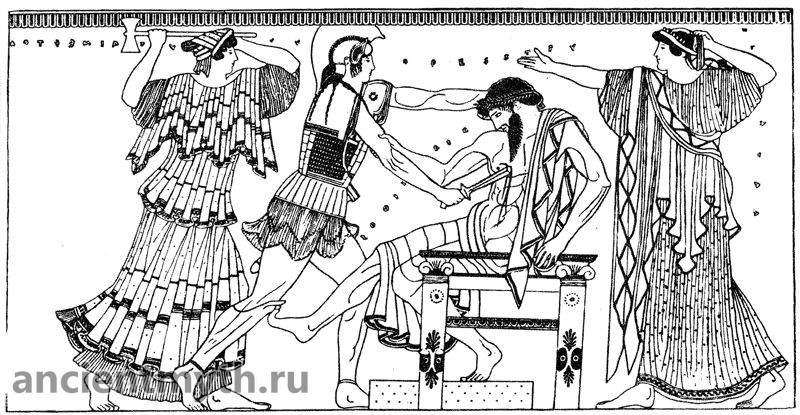Orestes avenges the murder of his father
Many years have passed since the death of Agamemnon. One day two young men in the clothes of wanderers approached his grave, which was located near the palace. One of them, about eighteen years old, was girded with a sword, while the other, a little older, held two spears in his hand. Grave grave The youngest of the young men went to the grave, cut off a lock of hair from his head and put it on the grave.

(Drawing on a vase.)
It was the son of Agamemnon Orestes, rescued on the day of Agamemnon's death by his nurse and brought up far from his homeland by the king of Phocis Strofiyo. With him was his friend, the son of Strofiy Pilad. Orestes had just offered his sacrifice to his father, when slaves in black clothes appeared at the door of the palace. They were walking to Agamemnon's grave. Among them was the daughter of the murdered tsar Elektra. She was dressed, like all slaves, in black clothes, her hair was cut off, the daughter of the king was no different from the rest of the slaves. Orestes and Pylades hastily hid themselves by the grave and began to watch what the slaves would do. Grave grave, they raised a loud cry and walked around the grave three times. Sent the slaves Clytemnestra, because at night she saw an ominous dream and was afraid that the soul of Agamemnon would be angry with her. The slaves had to propitiate her. But they hated Clytemnestra for killing Agamemnon and for oppressing them. And Clytemnestra oppressed them because they were all captured Trojans and, looking at them, she remembered her murdered husband.
Instead of begging the shadow of Agamemnon to have mercy, Electra, on the advice of the slaves, began to invoke the vengeance of the gods on the head of Clytemnestra. Yes, she could not do otherwise. With all the strength of her soul, Elektra hated her killer mother.
When the sacrifice was made and the slaves were about to leave, Elektra suddenly saw a lock of hair on the grave. By their resemblance to her hair, she immediately guessed that it was Orestes' hair. She picked up a lock of hair and wondered: why didn't Orestes himself come; why did he send only a lock of his hair? Then Orestes quietly approached his sister and called out to her. Elektra did not recognize Orestes right away, because she had only seen him as a young child. But Orestes showed his sister the clothes she had woven for him. Elektra was delighted. Orestes told her that he came here by the will of God Apollo, who in Delphi ordered him to take revenge on his mother and Egisfu for the death of his father. Apollo threatened Orestes with madness if he did not fulfill his commands. Orestes asked his sister to be careful and not to tell anyone that he had arrived in his hometown. When Electra retired to the palace, after a while Orestes and Pylades knocked at the gate; they told the servant who came out to them that they needed to see Clytemnestra to tell her important news, the servant summoned her from the palace, and Orestes told her that the king of Phocis had asked him to tell her that he had died Orestes, and the king does not know what to do with his body. Clytemnestra rejoiced at this news: now the one who could avenge her husband's murder has died. She informed Clytemnestra and Aegisphus, who was in the city, about the death of Orestes, and he hurried to the palace as soon as possible, without even taking with him his soldiers, who guarded him everywhere. Egisf was hurrying to certain death. As soon as he entered the palace, he fell, pierced by the sword of Orestes. Terrified, one of the slaves rushed to Clytemnestra and began to call for her help. She realized that she was going to pay for her crime.Suddenly Orestes came to her with a bloody sword. Falling at the feet of Orestes, Clytemnestra began to beg for mercy - after all, she was his mother, who nursed him with her breast. Orestes could not spare his mother, he had to fulfill the will of Apollo. He grabbed his mother by the hand and dragged her to where Egisf's corpse lay, and there he killed her. So Orestes avenged his father.
In horror, people began to gather at the doors of the palace, having learned about the death of Clytemnestra and Aegisphus. Not a drop of pity was awakened in any of the citizens for the hated tyrant Egisf and the treacherous Clytemnestra. The doors of the palace opened, and all saw the bloody corpses of Aegisphus and Clytemnestra, and Orestes stood over them. Orestes felt right when he committed this murder: after all, he was fulfilling the will of Apollo, avenging the death of his father. But suddenly the inexorable goddesses of revenge appeared before Orestes Erinii. Venomous snakes writhed around their heads, their eyes glittered with terrible anger. Orestes trembled at the sight of them. He felt his sanity gradually darkening. He left the palace and, persecuted by the Erinias, went to the sanctuary of Apollo at Delphi, hoping that God, whose will he fulfilled, would protect him.